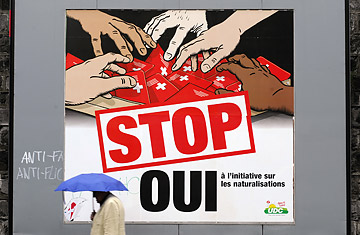
A man walks under a poster of the far-right Swiss People's Party in Lausanne, Switzerland.
Walking along Rue de Cornavin, near Geneva's main train station, Nesim, a 34-year-old immigrant from Turkey, stops to look at a poster plastered to a wall. It shows five dark-colored hands grabbing a stack of Swiss passports above the phrase STOP MASS NATURALIZATIONS.
The message is not lost on Nesim, whose dream of becoming a Swiss citizen is turning into a nightmare. Although he has fulfilled all the criteria necessary for naturalization — a 12-year residency requirement, fluent language skills, solid employment record as a mason, and good cultural integration — "I feel ostracized," he says. "I wonder whether I'll ever be 'good enough' to become Swiss."
The answer to Nesim's question may come on June 1, when the voters will decide who should have the final say in naturalization procedures: the authorities or the local people.
The controversial initiative was forced by the right-wing Swiss People's Party (SVP), which put up the poster that unsettled Nesim and has collected the obligatory 100,000 signatures required under Swiss law to put a constitutional amendment to a national vote. It seeks to overturn a 2003 Federal Court ruling that deemed ballot box votes on naturalization an infringement on the rights of would-be citizens. The decision was handed down after residents of the town of Emmen in central Switzerland repeatedly voted to reject citizenship applications from non-Western European nationals living in their midst.
A staunch proponent of tighter immigration policies, the SVP says Switzerland naturalizes more foreigners than any other European nation, and official figures seem to support that claim. The party charges on its website that more than half of all citizenship requests — in 2006, approximately 50,000 were granted in this country of 7.5 million — go to immigrants from the Balkans and Turkey. The SVP claims those immigrants commit a disproportionate number of violent crimes and abuse Swiss social and welfare benefits. Some official statistics do attribute the rise in serious infractions to resident foreigners, but the numbers are not clear. For example, official statistics show that in 2007 nearly 70% of all prisoners in Switzerland were foreigners, but some experts say that is because foreigners are considered a flight risk and are more likely to be sent to prison than local criminals.
The SVP argues that in a country based on grassroots democracy where voters can challenge any legislative decision by launching a referendum, the people, not what the party considers to be lenient government authorities, must approve each citizenship request. Each community must pick a competent panel to decide who among the local applicants is eligible for naturalizations, with the final decision left to the voters, the SVP says. While this system may be more difficult to implement in large cities, in small towns and villages, says Francis Matthey, a former socialist parliamentarian and currently President of the Federal Commission on Migration, "it would play right into the SVP's hands, because of the party's strong agrarian base." Under the current system a rejected candidate for citizenship has the right to appeal; the SVP wants any such decision to be irrevocable.
To Nesim, who is planning to apply for naturalization at the beginning of 2009, direct democracy is a double-edged sword. He worries that the new law might open the floodgates to subjective and harsh judgments. "What if someone doesn't like the fact that I am a Muslim?" he asks. "He or she will vote against me based on their personal bias."
Not so, says Christian Girard, a 19-year-old high school senior who is the vice-president of SVP's youth section in Geneva and supports the initiative. "Direct democracy has been a Swiss tradition for 150 years and we know how to vote responsibly," he says. "Naturalization must be a political, not an administrative process. And in a political process, people should be the ones to decide."
This stance does not resonate with Matthey, who says the system proposed by the SVP is flawed and open to discrimination. "It would give the voters in each community the power to decide, arbitrarily, another person's future, without so much as justifying their reasoning," he argues. "In a democracy, the voter should have a say in the issues relating to laws or principles, not to other people's lives."
Matthey says that the SVP neglects the fact that Switzerland needs immigrants to boost its labor force, and, in fact, the country has a long tradition of opening its borders to immigrants and refugees; at present, some 22% of the population is foreign-born, one of the highest rates in Europe.
"Naturalizing these people is not a matter of simply doing them a favor," he says. "A person who becomes a citizen will be more involved and respectful of our laws and values."
Girard insists that he — and his party — is not against granting citizenship to foreigners who are assimilated. "But we should be more selective in this process, rather than just handing out Swiss passports like candy to anyone who asks."
As the debate rages on, Nesim ponders his future. It is of some relief to him, he says, that the government as well as Switzerland's other parties, are urging voters to reject the SVP's initiative, deeming it unconstitutional and difficult to apply in practice. He hopes that, come June 1, the people will heed the advice. "I have waited a long time to be able to apply for citizenship, but the thought of townsfolk weighing in on it scares me. Should this initiative be accepted, I just won't apply for naturalization. Still," he adds, "whatever happens in the end, I will always love this country. It's a paradise."
Soon enough Nesim will find out if his love is reciprocated, or whether he's destined to remain a stranger in paradise forever.
